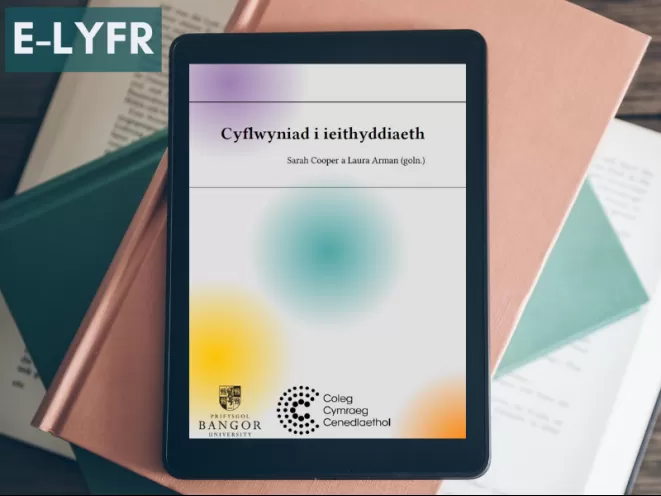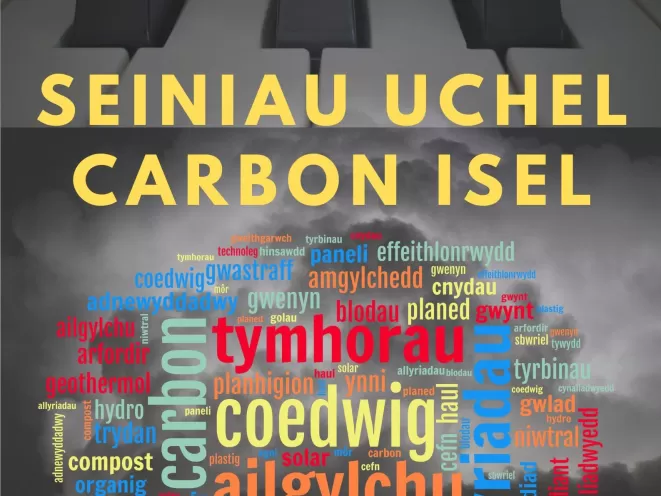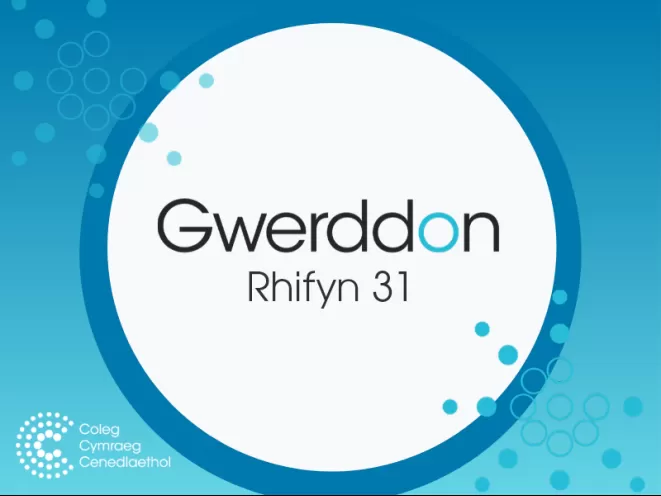This workshop will be helpful to anyone who wants to present information in alternative, and interactive ways, whether as part of a research presentation or in teaching. Workshop Objectives Develop a higher understanding of well-known software Taking Microsoft to another level Understanding that adopting simple techniques can lead to higher standard Managing the software so it works for you, and not 'captivating' Content Design unique templates to suit your presentations Deliver innovative work Identification of new equipment outside the common tools Effective use of PowerPoint for multi-purpose At the end of this workshop, trainees should be able to: Create interactive presentations that look and work differently from the ordinary with confidence Understand extended techniques for creating projects, long essays and effective reporting Consider tying the elements of each project together in an interactive portfolio, and show confidence in this process Presenter: Dyddgu Hywel Dyddgu studied BSc (Hons) Design and Technology Secondary Education course leading to Qualified Teacher Status' at Bangor University, she graduated with a first-class honors. After three enjoyable years as a Design and Technology A Level tutor at Coleg Meirion Dwyfor, she was appointed as a Design and Technology teacher at Rhydywaun Comprehensive School. She’s now on her seventh year as a senior lecturer in Education at Cardiff Metropolitan University, and has been there for over seven years. Her expertise varies in the effective use of teaching methods, the use of technology, engagement and student health and well-being.
MS PowerPoint for Researchers
Introduction to Linguistics
"Cyflwyniad i Ieithyddiaeth" is an introduction to the essentials of Linguistics for students who have no background, or not a great deal of background in studying language and the subjects of Linguistics (e.e. the sounds of languages, morphology and syntax, meaning, multilingualism and sociolinguistics).
Introduction to Open Access Publishing
This workshop includes a discussion about competing definitions of open access and the types of licences applied to open access publications. It considers the benefits and impacts of open access over traditional publishing methods, particularly in a Welsh language context and uses specific examples to demonstrate impacts in different sectors and for different stakeholders. Finally the workshop will consider the growing shift towards open access and what that might mean for the future of publishing in Wales and beyond. Participants will gain an understanding of how open access publishing works, how copyright affects accessibility and how different open licences limit or permit reuse. They will develop a better understanding of why open access publishing can be more beneficial than traditional commercial models, in certain cases, and how open access promotes equality and increases engagement with the Welsh language. This resource is presented by Jason Evans, National Wikimedian at the National Library of Wales. He has championed Open Access within the institution and more widely in the culture sector. Evans works with Wikimedia projects, including Wikipedia, to share the Library’s digital collections openly and to encourage engagement and participation in open crowdsourcing projects. Working closely with the Welsh Government he has led a number of projects to develop Welsh language open access content and data.
Data Analysis with ‘R’ and 'Python'
The aim of this training is to introduce effective and reproducible data analysis techniques in two open source programming languages, R and Python. This resource is presented by Dr Geraint Palmer who is a Welsh medium lecturer in the School of Mathematics at Cardiff University. His research in the field of Operational Research mainly involved modelling public services as queueing systems analytically and using computer simulation. This work applies topics such as probability, graph theory, data analysis, and software development. Content: A series of 10 videos (5 in R and 5 in Python), on the following topics: Downloading, installing, and starting the software Reading in data and producing summary statistics Plotting Combining and re-shaping data Hypothesis testing An example data set A practical task to coincide with each video On completion trainees should be able to: By working through this video series and the tasks, you will be able to start to analyse data with either R or Python. Specifically, you will know how to read in data to the software, produce summary statistics, plot, combine and reshape data, and carry out hypothesis testing.
Gwerddon Fach on Golwg 360 - contribute an article
Gwerddon Fach publishes short academic articles to give a wide audience a taste of the latest research by leading academics from Wales and beyond As well as publishing popular versions of longer articles that are published in Gwerddon's own e-journal, people are welcome to contribute short articles of around 600 - 1,000 words about any research that interests a wider audience - whether it's a report on their own and their colleagues' latest research, a response to major discoveries, public policy and current affairs or discussions, a report on the proceedings of an academic conference, or a simple introduction to complex research topics. If you are interested in contributing an article, please download the guide (see below) and contact Dr Hywel Griffiths, Assistant Editor Gwerddon: hmg@aber.ac.uk. Website: https://golwg.360.cymru/gwerddon
Gwerddon - contribute an article
Gwerddon is a Welsh-medium academic e-journal which publishes research in the Arts, the Humanities and the Sciences twice a year and which conforms to the academic guidelines of the Research Excellence Framework 2014. The journal has two main aims, which are to stimulate and encourage first-class academic discussion across as wide a range of subjects as possible through the medium of Welsh and thereby to create a store of scholarly material for the use of research students and academics. Gwerddon is funded by the Coleg Cymraeg Cenedlaethol. Website: http://gwerddon.cymru
The Good Supervisory Practice Framework
The Good Supervisory Practice Framework acknowledges, for the first time at a national level, the wide-ranging, highly complex and demanding set of roles involved in modern research supervision. Designed to set expectations for all supervisors and to support supervisor development programmes, the framework is authored by Professor Stan Taylor of Durham University, and is based upon the extensive body of academic research into supervision. Further information on the Research Supervision Recognition Program and the route to recognition is provided below. Contact Lois McGrath to discuss further: l.mcgrath@colegcymraeg.ac.uk UKCGE Website
The Event Bidding Process
These resources introduce the event bidding process including consideration of the views of the New Zealand Government and the application of the event bidding process for the FIFA World Cup 2026. PowerPoint slides, Panopto recording and a quiz are available. The resources are suitable for University students, further education or secondary school pupils.
Seiniau Uchel, Carbon Isel
'Seiniau Uchel, Carbon Isel' is a project lead by Bangor Univeristy in partnership with Pontio and M-SParc, and sponsored by the Coleg Cymraeg Cenedlaethol. They have organised a musical/video performance that will be streamed live on an AM channel. As part of the project, pianist and composer Tristian Evans will perform the 30-minute multi-media work ‘Dŵr, Haul, Gwynt, Golau’. Adopting the process of recycling in a creative context, Tristian Evans weaves together old religious tunes, archive visual material, Biblical texts and youth voices in two multimedia works for piano that respond to the climate crisis. Dŵr, Haul, Gwynt, Golau (Water, Sun, Wind, Light) integrates environmental words and visual materials created by young people that coincide with the piano score. Tir (Creadigaeth/Etifeddiaeth) (Land (Creation/Legacy)) responds to the notion of creation and legacy of the earth with Biblical references, in addition to exploring the pianist’s agricultural roots on Anglesey during the nineteenth century. The performance will last approximately half an hour on 25 November 2020 (19:30) Click below for further information
Avoiding Plagiarism: Effective Academic Writing [guide for tutors]
This resource supports tutors who offer guidance to students regarding good academic practice that they can apply to their reading and writing whilst avoiding plagiarism. Included within this resource are the following: Guidance in the form of a guide for tutors on introducing good academic practice related to avoiding plagiarism; Online materials (Sway presentations and quizzes) that can be shared directly with students; and Worksheets that can be shared with students. The central aim of the resource is to provide a convenient place for tutors to turn to for support and guidance that equips them with practical workshop ideas as well as interactive materials to share with their students. Dr Leila Griffiths Dr Leila Griffiths is a Study Adviser (Welsh medium specialism) at the Study Skills Centre at Bangor University. She has been working as part of a team that aims to help undergraduates and postgraduates develop the strategies and processes that will help them get the most out of their studies. Leila has experience of working closely with academic schools to support and complement subject-specific provision within the disciplines, and to disseminate good practice. Her experience of working with schools to develop the curriculum and of developing a skills module for the Coleg Cymraeg has recently been published here. In addition to the provision within academic schools, the Centre also provides individual face-to-face (usually), telephone or Teams appointments, maths and statistics support, as well as generic workshops and online study guides for students at all levels of study.
Huw L. Williams, 'Y Llwybr tuag at Heddwch Parhaol: John Rawls a’r Athrawiaeth Rhyfel Cyfiawn'
John Rawls’s just war doctrine is primarily interpreted as an elaboration of Walzer’s theory. However, when considered in light of Rawls’s Kantian commitments and the utopian nature of his reflections on international relations in The Law of Peoples, his perspective on just war is distinctive and challenging. This Kantian influence leads to a nuanced doctrine with a commitment to peace as the regulative principle of war, characterised as principles of transitional justice that are never fully just. A sceptical perspective emerges that rejects extending the just war doctrine to humanitarian warfare. The Rawlsian statesman would be a dove, rather than a hawk, committed to the belief that war is an evil to be avoided and overcome, and that universal peace should be aspired to.
'Ar Frys' Fideos - using welsh in public service jobs.
These videos highlight the experience of seven people working in important but stressful jobs, who see the benefit of being able to speak to people in Welsh. If you're following a Public Service or Healthcare course, then you'll learn how to deal with the public - especially in an emergency or danger situation. By using both English and Welsh, you give the person in crisis the choice to speak the language they are most comfortable speaking. As a result, you will perform your work to a higher standard. These videos were produced by Coleg Cambria.










![Osgoi llên-ladrad: Ysgrifennu academaidd effeithiol [canllaw i addysgwyr], Dr Leila Griffiths](/image_cache/0/3/f/8/9/03f89db70b2a722c1ff3373086eb270cf596996f.webp)

